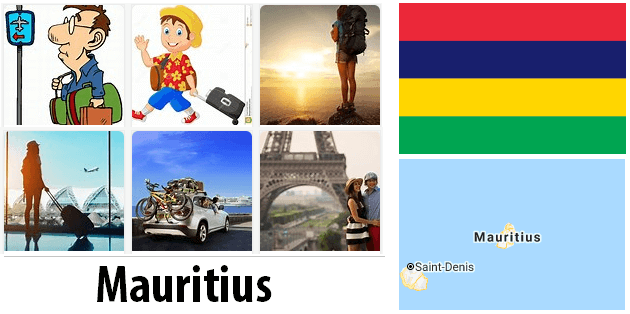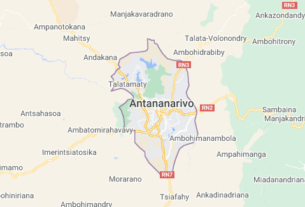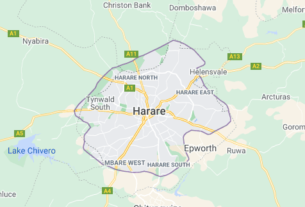According to ehistorylib, in 2005, Mauritius had an estimated population of 1.2 million people with a population growth rate of 1.2%. The economy in 2005 was largely based on tourism and textiles, with major exports including sugar, clothing and fish. Foreign relations in 2005 were largely focused on development assistance with Mauritius receiving aid from a number of countries including the United Kingdom, France and India. The politics of Mauritius in 2005 were dominated by Prime Minister Paul Bérenger who had been elected to office in 2003 after a highly contested election which had resulted in violence between supporters of different candidates. Bérenger’s government implemented major economic reforms aimed at improving living standards for all Mauritanians as well as encouraging foreign investment.
Yearbook 2005
Mauritius. According to countryaah, Port Louis is the capital and one of the major cities within the country of Mauritius. The opposition won the parliamentary elections on July 3. The Social Alliance, which includes Mauritius’s Labor Party and several small parties, received 42 of Parliament’s 70 seats. The ruling coalition, consisting of Mauritius Socialist Movement (MSM) and Mauritius Militant Movement (MMM), was given 24 seats. The turnout was just over 81%.
- Also see abbreviationfinder.org for how the acronym MU stands for the country of Mauritius and other meanings of this two-letter abbreviation.
The day after the election, Paul Bérenger, who was the country’s first prime minister of non-Indian origin, left his post. He was replaced by Social Alliance leader, Navin Ramgoolam, who was Prime Minister from 1995 to 2000.
Mauritius’s pressured economy dominated the electoral movement. Since the end of 2004, the country’s textile industries have been forced to lay off at least 10,000 employees as a result of increased competition from China and other low-wage countries following the abolition of textile quotas on 1 January 2005. During the year, the situation in the sugar industry began to deteriorate due to the EU’s reduced sugar subsidies to growers within the EU and in Mauritius and other former European colonies. In November, EU agriculture ministers decided to reduce the guaranteed sugar price level by 36%. This meant lower revenues for Mauritius, where sugar is the second most important export commodity. The country’s agriculture minister warned that lower prices would mean increased poverty and social chaos.
Country data
Area: 2040 km2 (world ranking: 170)
Residents: 1,265,000
Population density: 620 per km2 (as of 2017, world ranking: 156)
Capital: Port Louis
Official languages: English
Gross domestic product: 13.3 billion US $; Real growth: 3.8%
Gross national product (GNP, per resident and year): US $ 10,140
Currency: 1 Mauritius rupee (MR) = 100 cents
Embassy
Kurfürstenstr. 84, 10787 Berlin
Telephone 030 2639360,
Fax 030 26558323 berlin.mauritius.govmu.org
Government
Head of State: Bibi Ameenah Firdaus Gurib-FakimParamasivum Pillay Vyapoory, Head of Government: Pravind Kumar Jugnauth, Outside: Seetanah Lutchmeenaraidoo
National holiday: 12.3.
Administrative structure
9 districts, 3 branches (Rodrigues, Agalega, St. Brandon)
State and form of government
Constitution of 1968
Republic (in the Commonwealth)
Parliament: National Assembly with max. 70 members (62 elected, max. 8 seats for minorities reserved), election every 5 years.
Election of the head of state by parliament every 5 years.
Suffrage from 18 years.
Population of: Mauritians, last census 2011: 1,237,091 pop.
approx. 53% Indian, 43% Creole (African-Malagasy origin), 2% Chinese, 2% European
Cities (with population): (as of 2016) Port Louis 148,870 inh., Vacoas-Phoenix 106,253, Beau Bassin-Rose Hill 104,544, Curepipe 79,001, Quatre Bornes 77,492
Religions: 48% Hindus, 32% Christians (mostly Catholics), 17% Muslims (especially Sunnis); Minorities of Buddhists and others (as of 2006)
Languages: English; 39% Mauritian (French Creole), 31% Bhojpuri, 4% Tamil, 3% each of Hindi and Urdu, 2% each of Chinese and Telugu
Employees by economic sector: Agriculture. 7%, industry 26%, business 67% (2017)
Unemployment (in% of all labor force): 2017: 7.1%
Inflation rate (in%): 2017: 3.7%
Foreign trade: Import: 5.3 billion US $ (2017); Export: US $ 2.4 billion (2017)
History. – Supported by a very small majority, the moderate Labor government of S. Ramgoolam did not survive the elections of 11 June 1982 in which the left bloc triumphed (62 seats out of 70). The new government, led by A. Jugnauth, president of the Mouvement Militant Mauricien (MMM), launched an ambitious program of reforms aimed at attenuating, including through some nationalizations, the suffocating dependence of the country on single-crop sugar. In foreign policy there was a radical change with the claim of full sovereignty over the Chagos islands and in particular over the islet of Diego Garcia leased from Great Britain to the USA for military purposes.
The progressive coalition, pressed by the economic crisis due to the collapse of the price of sugar on world markets and corroded by internal rivalries, did not last long. In March 1983, the secretary of the WMM, P. Bérenger, left the department of finance. Jugnauth reacted by founding his own Mouvement Socialiste Mauricien (MSM) and, allied with the Labor-moderate bloc, won the early elections of 21 August 1983. That victory was also confirmed by the electoral round of August 1987, despite the fact that the government had previously been hit by the negative effects of some episodes of corruption. The situation changed radically when the MSM began to support a nationalistic orientation aimed, through the proclamation of the republic, at attenuating ties with London by abolishing the constitutional rule that entrusted the leadership of the state to the British queen, represented on the spot. by a governor general. On this institutional reform program there was a sudden change of alliances for which the two rival parties – MMM and MSM – decided to form a common electoral front which triumphed in the elections of September 1991. The new Parliament was thus able to approve a constitutional amendment which, which entered into force on March 12, 1992, made Mauritius a republic within the Commonwealth. On 30 June following, the exponent of the MMM C. Uteem was elected by Parliament to the office of President of the Republic.




